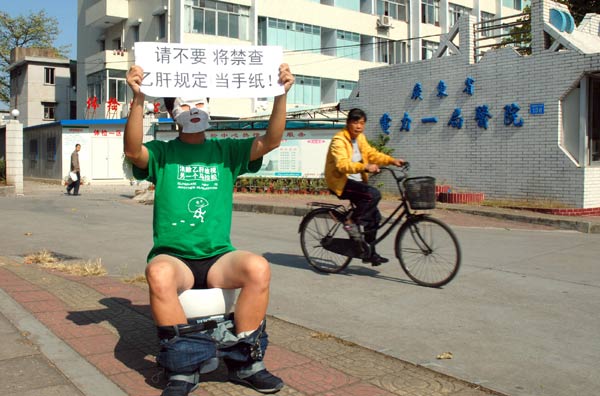Government and Policy
'Stop screening would-be workers'
By Shan Juan (China Daily)
Updated: 2011-02-14 07:02
 |
Large Medium Small |
 |
|
A masked man stages a sit-down protest in front of a hospital in Guangzhou, the capital of South China’s Guangdong province, on Dec 22. His sign says: “Please do not use the regulations that ban hepatitis B tests as toilet paper.” PROVIDED TO CHINA DAILY
|
In a statement released on Saturday, the Ministry of Health (MOH) said medical institutions are not allowed to carry out hepatitis B tests on behalf of companies as part of pre-employment physical examinations, regardless of whether or not consent is obtained from the candidates.
The move is aimed at safeguarding people's right to work in a country where discrimination is rife against carriers of infections such as hepatitis B and HIV/AIDS.
Hospital directors found to have violated the rules will be exposed to the public and will invite strict administrative punishments, the ministry said.
The latest move follows the results of a survey released last week showing that, despite existing rules and regulations, some 61 percent of 180 State-run companies polled still include hepatitis B screenings in their pre-employment physical examinations.
Moreover, 63 of the 180 companies either said they would never consider hepatitis B carriers for a job or would be reluctant to hire such people.
The survey was conducted by the non-profit Beijing Yirenping Center.
Yu Fangqiang, leader of the advocacy group, told Xinhua News Agency that such violations were mainly down to the light punishments available for those who break the rules and the pursuit of profits by some medical institutions.
In the past, employers have only been fined a matter of thousands or tens of thousands of yuan for carrying out such tests, and then only if they lose lawsuits.
The legal actions are expensive and few candidates discriminated against have the time and money to bring such cases.
Liu Xiaonan, an associate professor with the China University of Political Science and Law, called on the government to hammer out a specific law and set up a special committee to investigate such cases of discrimination in order to ensure the rights of hepatitis B carriers are protected.
Given that China has about 120 million hepatitis B carriers and at least 20 million chronic hepatitis patients, awareness of the conditions remains low among the public, experts said.
It has been scientifically proven that the hepatitis B virus can only be transmitted from mother to child during childbirth or by contact with the blood or other bodily fluids of an infected person, not by casual contact.
In its statement, the MOH ordered health administrations nationwide to carry out careful investigation into all cases of hepatitis B-related discrimination and pledged that hospitals found to be still providing such tests to employers would be punished in accordance with laws and regulations.
On Feb 10, 2010, the ministries of health, education and human resources and social security jointly issued a circular demanding the cancellation of such screening tests during health checks for school enrollment and employment nationwide.
China Daily
(China Daily 02/14/2011 page4)